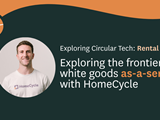Exploring the frontier of white goods as-a-service with HomeCycle
In the latest episode of HappyPorch Radio, we had the chance to explore a lesser known corner of innovation in the circular minded rental space: white goods. As in large appliances such as washers and dryers, dishwashers and refrigerators.
Giving a French perspective on this realm was Valentin Lhereux of HomeCycle.
Valentin’s experience having been both a product designer and buyer previous to this role gave him a perspective that inspired his decision to explore a more circular way of doing business. One that also portends a greater opportunity for a wider range of products going the circular route:
“I was really witnessing the situation where I had my customer in store that was asking me to have less and less expensive products, but more and more quality. And then as a Buyer, I had to go to see the manufacturers and I was there like ‘Okay, I need to have the best price as possible, but the best product as possible.’ And so I was witnessing…this linear economy where…it cannot be sustained in the long run. We need to change the way this market is functioning.”
Their proposed solution, at least when it comes to white goods? Make the best quality available for rent. But not stop with that, a model that’s existed for decades. They include full support for the product, throughout the lifetime of the rental. In removing the hassle of getting a machine repaired, cleaned and maintained, which often has people simply giving up on their appliance and buying new, they remove that concern. At an exceptionally reasonable monthly price.
Their customer profile has differed substantially from what they first suspected
While they expected students and expats to be their primary customers, such was not the case:
“And in the end, to be honest with you, of course we touch them, but these are not our main customer. The main one today for HomeCycle is first someone that do not want to face the burden to handle a repair, to handle the delivery and the installation. To handle ‘What should I do if my product is not working anymore?’ Because once you add it in your life you don't want to handle it anymore because you don't know what you have to do.”
He saw a second point of motivation, that applies across demographics:
“When a product breaks down, most of the time it's not when you planned it. And so you have to buy a new product. And when you look at the market, okay, 600 euros, 500 euros, 800 euros, and you're like, Okay, I would prefer to go on holiday with my children with this money than just putting all the money in the washing machine.
And so we have people that decide, Okay, I want to have still a good product, a quality product that is beautiful in my kitchen or in another room. And so I will use the rental because I see the services and I see that they can have access to a better product than what I would've bought in the traditional market.”
This, to us, epitomises a substantial opportunity to gain market share, accessing those that prioritise simplicity, peace of mind and financial fluidity. Which is a wide swath of the population.
An interesting crossover between B2C and B2B
While HomeCycle noted differences in how and who they served in the B2C and B2B spaces, there were some that overlapped, and could prove an opportunity for your business:
“When we started the interviews with co-working spaces, co-living spaces we started to see that actually they were facing quite similar issues as a normal, let's say, client in B2C. They needed to have a quick repair, they needed to have a quality product. And we saw that the service that we were offering could really work for B2B partners. And actually it went quite fast because as soon as we started, we managed to have some partnership with co-living spaces, co-working spaces. They decided they would prefer to rent the product because they were benefiting of all the services that we could provide.”
The advantage of this path goes further for such businesses:
“And also sometimes for some of them, let's say the smallest one, when they need to buy for a house that they just built, they need to buy three washing machine, two fridges, two dryers. Having this product, not needing to amortise them, but having them directly in the operational cost.”
An unexpected additional source of business
“Our customer are mainly in cities, but we see that we have customer also quite far from cities. And that's interesting because when we discuss with them they also need to have the services that we could provide to the cities. And sometimes they are even more, I can say, left behind from the traditional companies. So that's super interesting and that's why we decided to address all the territory, all France, in terms of delivery, that means that we don't have any exclusion. Because we wanted to give also the opportunity to people that maybe are a little bit more remote to still have access to quality products and to still have access to the services of repair.”
Doing so might cost your business more, but it would, we suspect, engender greater loyalty and uptake, given your more expansive range as compared to the other competitors, both circular and linear.
The “Royal way” to finance your inventory
While HomeCycle has had no problem gaining traction, it’s the ability to procure enough inventory that is a challenge they’ve faced. Valentin shared the four routes such businesses could go, ending with what he considers the “royal way,” one that could lead to far greater circularity in products.
“The first one is, okay, you have a big amount of cash. You are able to raise money every six months. And you manage to purchase the product as you would purchase in the B2B relation, and then we rent it and you have enough money to wait for the 12, 16 months, to find your money back.
Second way is you could have a private investor that invest in SPVs, Special Purpose Vehicle. And you give them back some cash from the rental of the product that they purchased.
Third way that is quite common is okay, you have a financial institution that jump into your economic model. And so when you have a rental, actually you sell them the product and they own the asset and they collect the subscription, the subject amount.
And the last one, which is the one that we really fight for in HomeCycle, that we think it's the royal way, is to partner directly with the manufacturer to work in share revenue. And this one for us is the best way to do rental because you really have an alignment of all the value chain.
Because as you incentivise the manufacturer to the revenue that you do he's starting to think, Okay, how can I give you a better product that lasts longer, that is more repairable? Because with you, if we are able to rent it two to three times, I will win more money.”
It’s what happens after that that catalyses true change:
“When we start to have discussions with manufacturers where they say, Okay, if it starts to grow, maybe we could start to think about building a product that is made for rental. The product that is really repairable, really durable with maybe some pieces that are easy to replace from the customer himself so for me it brings all the motivation that we have to do this kind of business because in this kind of discussion, you are really changing all the value chain and all the perception of the different actors.”
Tending to the little details can have a big impact
Valentin shared an interesting point that bears factoring in, for anybody in the appliance rental sector:
“We have a lot of studies that show that 60% of the breakdowns that you have on your products in the first five years are linked to a lack of cleaning or maintenance of your product.”
So they are actively seeking ways to increase that happening, a combination of helping customers do it themselves, sending fragile parts, and where needed, having professionals install them. What gets interesting here is that they’ve been exploring gamification options to motivate customers to clean and maintain the product.
Why go to all this effort?
“We know that at the end of the rental we will get back product that will be in better shape. And we really augment the probability to rent it again. And also we have a better product. Not a better product, but we have a clean product for the customer. So we know that it's going to be happy to continue, to be happy using this product.”
Circular specific software remains scarce, but resources are emerging
When asked about the tech stack they use to manage and optimise around the data their products and customers generated, Valentin didn’t mince words:
“To be honest, it's difficult. Why? So as we are a small startup, we don't have unlimited resources. And so we have to use tools that already are existing on the market. ERPs, CRM, all of that. But what is super interesting is that as we are trying to bring to scale a new model with the tools that we use are made for the classical e-commerce.
They are really good for a purchase, classical purchase. And then you never hear about the customer anymore.
Here in our position, in the rental, what's really important is the asset, is the product to be able to track, okay? This product was in this house during six months, then you get it back, you refurbished at this place, and then you put it in another house, and then you add a repair. And to be able to have all the life of the product, and even if you push it further, is to have the return on investment for this product.
And there is, to my knowledge, to be honest with you, no real tool existing today that brings you this view. And that's super interesting because we see that even some software that say that they are for the rental, actually the most of them, they built their software on the model of rental where you were sending boxes every month.”
We can empathise. That’s why one of the core focuses of our business is serving exactly this market, helping better integrate their existing tech stack, and enhancing its capabilities with swiftly made, agilely changeable software tools, tailored to your specific needs.
=====
Want to go deeper? We invite you to take in the full episode, both in audio and written form, along with all associated links, here. Beyond that, we are always here to support your circular ambitions, with a nuanced, long term approach to technology inclusion. Learn more about our services here.


About the author
Paul Smith
Paul is a self-described communications Swiss Army Knife, having spent the majority of his career supporting beneficially impactful companies across the spectrum effectively tell their story to the world. The circular economy is a long time love of his, so he’s thrilled to now play a part in expanding its impact in the world. When not behind the computer, Paul can usually be found behind a book, on his bike exploring, or out for a walk in the forests of Fontainebleau, getting a closer look at the latest moss…